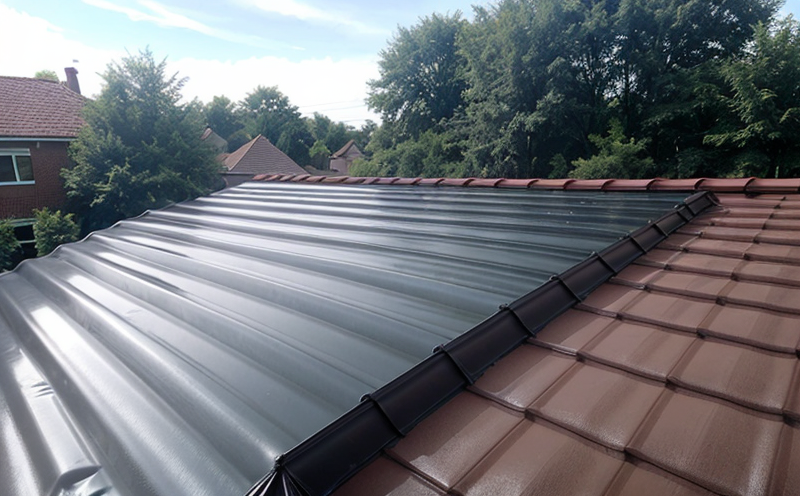ASTM D4869 Bituminous Sheet Roofing Resistance Testing
The ASTM D4869 standard provides a standardized procedure for determining the resistance to water penetration of bituminous sheet roofing materials. This testing is critical in ensuring that roofing systems meet durability and performance standards, especially in regions with high rainfall or harsh weather conditions.
This test assesses the ability of a roofing material to resist water infiltration when subjected to hydrostatic pressure. The procedure involves placing a specimen under controlled conditions where it is exposed to a continuous flow of water from below for a specified period. The resistance to water penetration is measured by determining how much water passes through the material over time.
The significance of this test lies in its role as a quality assurance measure that helps ensure roofing materials perform optimally during installation and throughout their service life. By adhering to ASTM D4869, builders, architects, and engineers can select roofing systems that are reliable and durable, thereby reducing maintenance costs and extending the lifespan of structures.
Roofing and waterproofing are essential components of any building infrastructure designed to withstand environmental stressors like rain, snow, wind, and temperature fluctuations. The performance of these materials directly impacts the overall integrity and longevity of buildings. In this context, ASTM D4869 serves as a critical benchmark for evaluating the effectiveness of bituminous sheet roofing in resisting water penetration.
The test procedure outlined in ASTM D4869 is applicable to various types of bituminous sheet materials including felts, laminates, and composite sheets. It is designed to simulate real-world conditions that these materials might encounter during their service life. By conducting this test, manufacturers can ensure that their products meet the necessary standards set forth by industry regulations.
For quality managers and compliance officers responsible for ensuring product quality within organizations involved in construction projects, understanding ASTM D4869 is essential. This standard plays a pivotal role in maintaining high-quality roofing systems across different sectors such as commercial buildings, residential complexes, industrial facilities, and public infrastructure projects.
- Customer Impact and Satisfaction: By conducting ASTM D4869 testing, manufacturers can demonstrate their commitment to delivering superior products that meet or exceed industry standards. This leads to increased customer satisfaction and loyalty, as clients trust in the reliability of the roofing materials used in their projects.
In conclusion, adhering to ASTM D4869 not only ensures compliance with established testing protocols but also enhances the reputation of manufacturers by showcasing their dedication to producing high-quality roofing solutions. This contributes significantly to long-term customer satisfaction and trust within the industry.
Eurolab Advantages
At Eurolab, we pride ourselves on providing comprehensive testing services tailored specifically for the building & infrastructure sector. Our state-of-the-art laboratory facilities equipped with advanced instrumentation enable us to deliver accurate and reliable results that meet international standards like ASTM D4869.
We offer several key advantages when it comes to performing ASTM D4869 Bituminous Sheet Roofing Resistance Testing:
- Expertise: Our team comprises highly skilled professionals with extensive experience in the field of materials testing. They possess deep knowledge about various roofing materials and their properties, ensuring precise interpretation of test results.
- Compliance: We adhere strictly to all relevant international standards including ASTM D4869, guaranteeing that our tests are conducted in accordance with recognized guidelines.
- Accuracy: Utilizing cutting-edge equipment and methodologies allows us to achieve highly accurate measurements of water resistance performance. Our precision ensures consistent results across multiple samples and repeatable outcomes.
- Efficiency: Streamlined processes and efficient workflows minimize turnaround times without compromising on quality, allowing clients to receive timely reports promptly after testing completion.
- Supportive Consultation <|im_start|><|im_start|>GuidId





